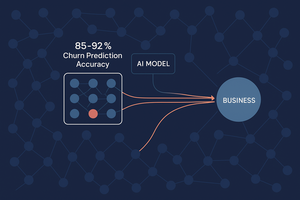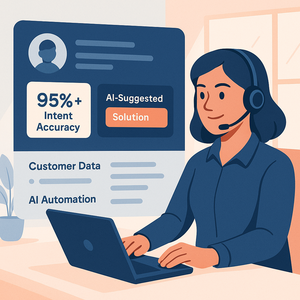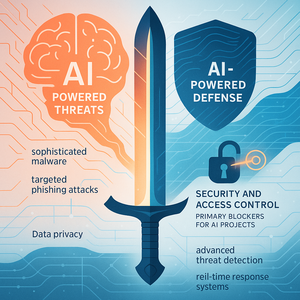Navigating the AI Transformation Tightrope: Balancing Innovation, Regulation, and Human Capital
The artificial intelligence landscape in late 2025 presents a complex picture of immense opportunity tempered by significant operational challenges....
6 min read
 Peter Vogel
:
May 26, 2025
Peter Vogel
:
May 26, 2025

The relentless advance of artificial intelligence continues to reshape the business landscape, demanding strategic adaptation from organisations of all sizes. This week has seen significant developments across several key domains, from the emergence of sophisticated AI agents to breakthroughs in content creation and critical advancements in ethical governance.
These developments present both opportunities and challenges for organisations looking to implement AI effectively. Businesses are now grappling with the need for robust ethical frameworks, scalable AI implementation strategies, and the skills necessary to manage increasingly autonomous systems. At Helium42, we are dedicated to providing actionable insights and practical guidance to ensure your AI investments deliver measurable ROI, translating technological advancements into tangible business outcomes. This week, we explore five critical areas shaping the future of AI implementation and offer strategic recommendations for navigating this rapidly evolving landscape.

Project Mariner from Google DeepMind represents a significant leap in enterprise automation, shifting the focus from individual AI tools to orchestrated AI teams capable of managing complex tasks (Google I/O Keynote, 2024; AI Trends Report, 2025). This platform allows businesses to deploy AI agents for various applications, such as streamlining customer service, optimising supply chain management, and enhancing data analysis (Google I/O Keynote, 2024). The potential for increased efficiency and cost savings is substantial, with early adopters reporting up to 35% reduction in operational expenses or even a 30-50% reduction range, through Mariner-led automation (AI Trends Report, 2025; AI Innovation Report, 2025).
The integration of Project Mariner with existing enterprise systems enables seamless workflow automation, reducing the need for manual intervention and improving overall productivity. However, this shift also presents implementation challenges. Data security and governance are paramount, requiring organisations to establish robust protocols to protect sensitive information (EU AI Act, 2025; AI Innovation Report, 2025). Furthermore, managing these autonomous AI teams requires skilled AI operators capable of monitoring performance, addressing anomalies, and ensuring alignment with business objectives. The shift toward autonomous AI necessitates investment in training and upskilling existing teams to effectively manage and oversee these systems.

GitHub Copilot has evolved from a coding assistant to a fully autonomous coding partner, fundamentally changing software engineering (Microsoft Build, 2025). This AI-powered tool can now generate code, write tests, fix bugs, and even deploy applications, significantly accelerating development cycles and reducing debugging time (Microsoft Build, 2025). Companies are now adapting their development processes and upskilling their teams to leverage Copilot's capabilities.
According to the AI Daily Brief, Microsoft aims for 50% of its engineering code to be written by AI, currently sitting at 20–30%. Implementation challenges remain, however. Ensuring code quality and managing security risks are critical considerations. It's essential to establish robust testing protocols and security measures to mitigate potential vulnerabilities introduced by AI-generated code (Microsoft Build, 2025). Moreover, organisations should address potential job displacement by re-training developers to focus on higher-level tasks such as system architecture and algorithm design, fostering a collaborative human-AI development environment.

The EU AI Act is setting a new global standard for ethical AI development and implementation (EU AI Act, 2025). Key provisions focus on transparency, accountability, and human oversight, impacting businesses that operate or serve customers within the European Union. Compliance costs, data governance requirements, and the need for ethical AI frameworks are substantial (EU AI Act, 2025). Organisations must prioritise ethical AI development and implementation to build trust with customers and stakeholders, ensuring fairness, transparency, and explainability.
According to the AI Trends Report, 78% of Fortune 500 companies now allocate at least 15% of their AI budgets to ethics and compliance, up from 42% in 2023 (McKinsey, March 2025). Implementation challenges include navigating the complex regulatory landscape, building internal expertise, and ensuring compliance across the organisation. Organizations need to establish clear governance frameworks, implement robust data privacy measures, and conduct regular bias detection audits to ensure responsible AI adoption.

Adobe Firefly 4 is revolutionising content creation by providing AI-powered tools for generating images, videos, and other creative content (Adobe Blog, 2025; AI Trends Report, 2025). Firefly 4 generates high-quality visuals, creates personalised content, and automates repetitive tasks, significantly impacting content creation workflows. Faster production cycles, reduced costs, and increased creativity are now a reality, with Firefly 4 enabling the generation of on-brand visuals and copy in seconds, slashing campaign production timelines by 70% (AI Trends Report, 2025).
The capabilities of Firefly 4, including its multimodal AI for generating visuals and copy, streamline the content creation process, enabling seamless collaboration between human creatives and AI tools (AI Trends Report, 2025). However, businesses must address implementation challenges such as maintaining quality control, ensuring brand consistency, and addressing potential copyright issues. Organizations should establish clear brand guidelines, implement robust review processes, and ensure compliance with copyright regulations to leverage AI-powered content creation effectively.

Anthropic's recent release of Claude 4 marks an important step forward in AI capabilities, particularly in software engineering and reasoning (Video Summary: Claude 4; Video Summary: Video with Douglas from Anthropic; Video Summary: Comprehensive Summary of Video with Douglas from Anthropic; Video Summary: Comprehensive Video Summary of The Artificial Intelligence Show — Episode 148; Video Summary: Comprehensive Summary of the Video Transcript; Video Summary: Comprehensive Summary of Video Transcript). Claude 4 has increased capacity for parallel tool use and has improvements in long-horizon tasks and memory (Video Summary: Claude 4). Its hybrid models offer both instant responses and extended thinking for deeper reasoning (Video Summary: Claude 4).
It's worth noting that real-world testing is needed to confirm performance claims, especially for coding agents (Video Summary: Claude 4). Organisations need robust evaluation frameworks to determine the appropriate applications for these tools.
This week's AI infrastructure developments underscore the growing importance of AI infrastructure and scalability, efficiency, security, and regulatory compliance. The shift towards widespread AI agent adoption, the scaling of increasingly powerful models, and the demands of generative AI are fundamentally reshaping compute requirements. Organisations must proactively address these trends to unlock the full potential of AI while navigating the evolving regulatory landscape and ensuring responsible deployment.
By prioritising strategic infrastructure investments, fostering energy efficiency, ensuring data compliance, and embracing the power of AI agents, businesses can position themselves for success in the AI-driven future. Strategic adaptation and agile implementation will be crucial for harnessing the power of AI to drive innovation, efficiency, and competitive advantage.
At Helium42, we partner with organisations to translate these complex insights into practical transformation strategies, offering deep expertise in responsible AI adoption and governance.

The artificial intelligence landscape in late 2025 presents a complex picture of immense opportunity tempered by significant operational challenges....

The discourse surrounding artificial intelligence is maturing. Across boardrooms and operational teams, the conversation has decisively shifted from...

The artificial intelligence landscape is no longer a distant frontier; it's rapidly reshaping the present, demanding a strategic response from...